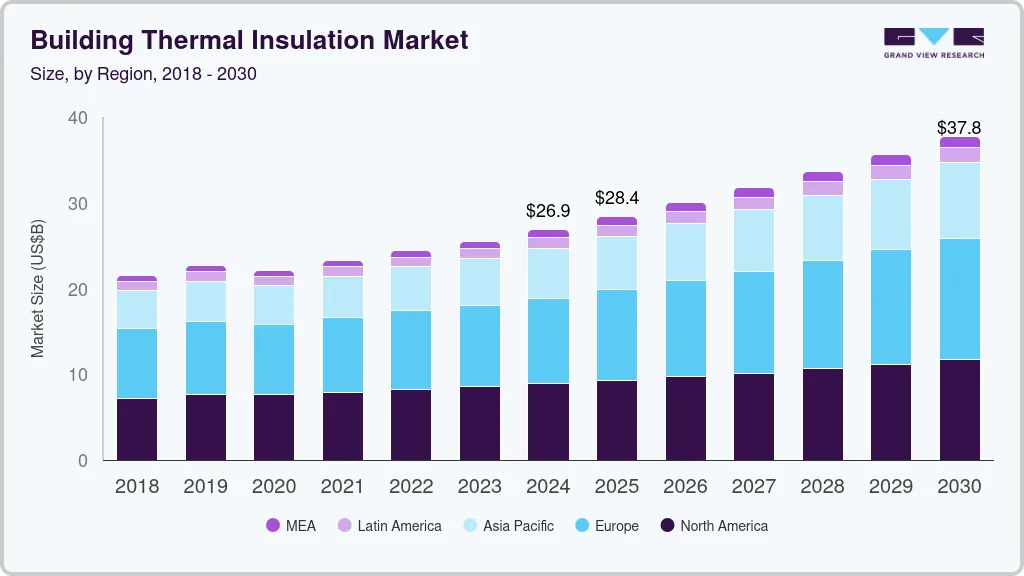Building Thermal Insulation Market Growth Driven by Green Certifications
The building thermal insulation market is witnessing steady growth driven by stringent energy efficiency standards, sustainable construction practices, and the rising adoption of green insulation materials.
The global building thermal insulation market was valued at USD 26.9 billion in 2024 and is projected to reach USD 37.8 billion by 2030, growing at a CAGR of 5.9% from 2025 to 2030. The market growth is primarily driven by increasing residential and commercial applications aimed at reducing overall energy costs and the rising awareness of energy conservation.

Favorable government regulations targeting energy efficiency continue to support market expansion. Building insulation minimizes reliance on heating, ventilation, and air conditioning (HVAC) systems, significantly lowering overall energy consumption.
Growing concerns about the environmental impact of insulation materials are encouraging manufacturers to develop eco-friendly and recyclable alternatives. The rising prices of plastic foam insulation materials are further prompting the shift toward green, biodegradable, and recyclable products, strengthening the threat of substitutes in the market.
Key Market Trends & Insights
- The building thermal insulation market in Europe accounted for the largest revenue share of 34.9% in 2024.
- By product, glass wool insulation segment dominated the market with a revenue share of 37.1% in 2024.
- By end-use, residential segment accounted for the highest revenue share of 53.2% in 2024.
- By application, wall segment led the market in 2024.
Download a free sample PDF of the Building Thermal Insulation Market Intelligence Study by Grand View Research.
Market Size & Forecast
- 2024 Market Size: USD 26.9 Billion
- 2030 Projected Market Size: USD 37.8 Billion
- CAGR (2025–2030): 5.9%
- Leading Region (2024): Europe
Competitive Landscape
Key players shaping the global building thermal insulation market include BASF SE, Saint-Gobain S.A., Dow, and Owens Corning.
- Saint-Gobain S.A. designs, manufactures, and distributes high-performance and sustainable building materials, providing solutions for energy efficiency and environmental protection.
- Dow operates across multiple sectors, including building, construction, and infrastructure, with 103 manufacturing sites in 31 countries worldwide.
Emerging participants such as Fletcher Building, American Rockwool Manufacturing LLC, GAF Materials Corporation, and Byucksan are gaining traction through innovation and regional expansion.
- Rockwool Manufacturing LLC produces mineral wool boards and cement for insulation applications across residential and industrial sectors.
- Byucksan offers a diverse portfolio of building products, including ceiling, insulation, exterior, and interior systems.
Key Companies Profiled
- Rockwool International A/S
- GAF Materials Corporation
- Huntsman International LLC
- Johns Manville Corporation
- Cellofoam North America, Inc.
- Atlas Roofing Corporation
- Dow
- Owens Corning
- Saint-Gobain S.A.
Explore Horizon Databook – the world’s most comprehensive market intelligence platform by Grand View Research.
Conclusion
The building thermal insulation market is witnessing steady growth driven by stringent energy efficiency standards, sustainable construction practices, and the rising adoption of green insulation materials. Increasing focus on eco-friendly and recyclable solutions will continue to shape innovation and competition in the coming years.